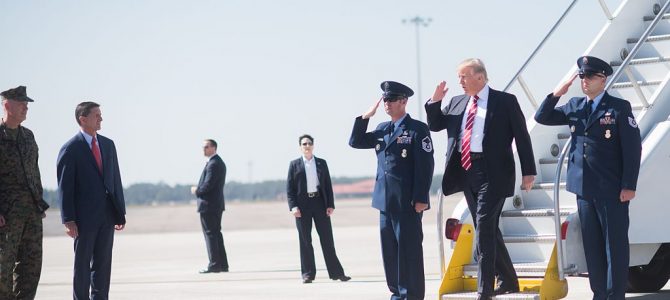
With his major initiatives stymied by Congress and the courts, President Trump has begun griping about the media holding him to “the ridiculous standard of the first 100 days.” The good news for Trump is he can argue for an extension: according to some of America’s preeminent “thought leaders,” he wasn’t really president until he hit Syria with 59 Tomahawk missiles on April 6.
“The Trump administration can truly be said to have started only now,” exulted neoconservative foreign policy guru Elliot Abrams the day after the airstrikes. “Donald Trump became the president of the United States [last night],” echoed CNN’s Fareed Zakaria. It was “a big moment,” “a kind of education of Donald Trump,” Zakaria gushed: Trump “realized [that] presidents don’t need to go to a pesky Congress every time they want military force.”
As a practical matter, Zakaria is right: perversely, it’s in the use of military force—the area where presidents are most dangerous—where they now have the freest hand. The president can’t unilaterally pass a tax cut or a new health-care plan, but say the word, and the missiles will fly. When he’s showered in media accolades for doing so, it can make the resort to force particularly seductive.
With tensions rising on the Korean Peninsula, the Trump team has signaled it may be ready to unleash another barrage, if it can just get our errant “armada” into position. Asked last Monday whether the president was “prepared to act alone” against North Korea, White House press secretary Sean Spicer replied they’d make sure Congress is “notified,” but “I think he’s going to utilize the powers under Article II of the Constitution.” Now that’s presidential!
War Abroad Distracts Americans from Home
Our Constitution’s framers had a far narrower view of the president’s powers, and envisioned a broader role for that “pesky Congress” in matters of war and peace. As James Madison put it in 1793, “In no part of the constitution is more wisdom to be found, than in the clause which confides the question of war or peace to the legislature, and not to the executive department”; were it otherwise, “the trust and the temptation would be too great for any one man.”
There’s a good deal of political-science evidence suggesting that the “temptation” Madison warned about is real. The “rally effect, “for “rally round the flag,” describes the popularity boost presidents derive from international conflict: “Scholars have repeatedly found short-lived spikes in US presidential approval following US uses of military force.”
The “diversionary war” hypothesis—the scholarly moniker for “Wag the Dog”—proposes that beleaguered presidents may seek to distract the public by waging war abroad. Here, the evidence is more mixed. But various studies have found that presidents are more likely to use force during periods of economic stagnation, or high unemployment, and that “presidents resort to the sword more quickly when their approval ratings decline.”
Some presidents may be particularly susceptible to temptation: “More conceptually simple leaders—particularly when high in distrust, a trait linked to more hawkish policy inclinations—are significantly more likely to engage in diversion.”
The Media Love War. Middle America, Not So Much
Whatever motivated Trump’s Syria strike, it seems to have given his dismal approval ratings a nudge. Moreover, judging by the chorus of approval from American “opinion leaders,” the president may have to rethink his view that the press is the “enemy of the American people.” On Syria, media elites proved themselves far more likely to “rally round the flag” than will guys in trucker hats.
The “failing New York Times” greeted the airstrikes with the headline “On Syria Attack, Trump’s Heart Came First.” He “did the right thing” was the common refrain from former critics, like the Times’ Nicholas Kristof, the humanitarian hawk Anne-Marie Slaughter, and neoconservative #NeverTrump-er Bret Stephens.
It’s no surprise that, as a senior White House official told the Washington Post’s David Ignatius, “The decision to strike a Syrian air base was a confidence builder for an inexperienced and sometimes fractious White House.” After all, “Trump couldn’t be sure when he launched the attack that a Russian wouldn’t be killed, or that some other freak mishap wouldn’t arise.”
We managed to dodge the worst-case scenarios, but new dangers lie ahead. As Madison warned: in war, “laurels are to be gathered, and it is the executive brow they are to encircle. The strongest passions and most dangerous weaknesses of the human breast; ambition, avarice, vanity, the honourable or venial love of fame, are all in conspiracy against the desire and duty of peace.”
Two centuries later, our political culture has degraded to the point where it encourages the worst presidential temptations—and we’ve made waging war nearly as easy as firing off a tweet. If, per Fareed Zakaria, we’re witnessing the “education of Donald Trump,” what lessons is he being taught?









